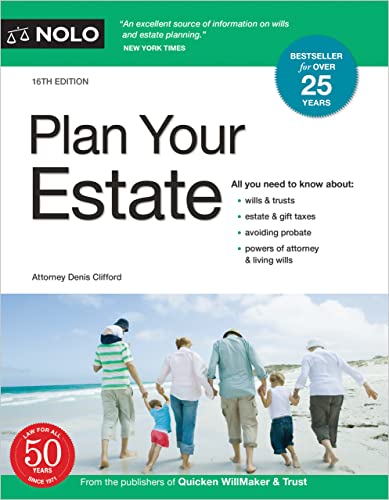
English | 2022 | ISBN: 1413329810 | 545 pages | True PDF EPUB | 9.01 MB
Turn to Plan Your Estate for straightforward, plain-English explanations of each of your estate-planning options, so you can make the best decisions for you and those you love. Attorney Denis Clifford shows you how to: avoid probate leave property through a will or trust use life insurance to provide for your loved ones name a guardian for your minor children leave property to a young person plan for incapacity implement strategies specific to business owners reduce estate taxes make final arrangements This book is for seniors doing end-of-life planning, parents planning for their young children's futures, adult children helping their parents make end-of life plans, as well as readers of any age who want to learn about estate planning. No matter what category you fit into, if you're like most people, you understand that estate planning is a good idea. You know that estate planning ensures that your property will pass to the right people with minimal delay, red tape, and cost. And if you do have young children, you likely know that you need an estate plan to have a say in who will care for your children if you're not around to do it. Perhaps you even know that you can use your estate plan to leave specific instructions about your finances and medical care in case you become incapacitated and unable to make those decisions for yourself. Although you may know all of that, it's all too easy to put off actually sitting down and making your plan. We understand. Estate planning is not easy—first, because it forces you to think about your mortality, and second, because of the legal complications and legal fees that often come with it. Plan Your Estate is here to help. This book explains estate planning in plain English, step by step, option by option. Once you know your choices, you can confidently move toward making an estate plan that fits your circumstances and wishes. Plan Your Estate covers these estate planning goals: Leaving property. If you are not wealthy, you might use a simple will or living trust, or both. You can also use co-ownership, transfer-on-death accounts, or beneficiary designations. If you have a large estate, you might also leave property to beneficiaries in more complicated ongoing trusts. No matter how you leave your property, it is better to have a plan—if you die without one, state law will decide who gets what. Providing for young children. If you have young children, you'll want to ensure that they will be well cared for if you die before they become adults. In your will, you can name guardians to raise them and managers to look after their inheritance. You'll also likely want to buy life insurance to make sure that your kids have money after you're gone. Planning for incapacity. Part of estate planning is preparing for what would happen if you ever became unable to make medical and financial decisions for yourself. You can use a health care directive to name someone who will make medical decisions on your behalf and to express your wishes about end-of-life care. You can also prepare a durable power of attorney that gives a trusted person control of your finances. Preparing these documents can save your family much heartache. Avoiding probate. Probate is a court-run process for wrapping up an estate. It's often expensive and time-consuming, yet rarely provides any benefit to the beneficiaries. Thankfully, with a little planning, probate is fairly easy to avoid. Trusts, pay-on-death accounts, joint tenancy, and other probate avoidance methods can keep most or all of your estate out of probate, saving your loved ones time and money. Reducing estate tax. Most people won't owe federal estate tax. But if you expect to leave over $11 million (or $22 million as a married couple), you'll probably want to use your estate plan to reduce the tax that your estate could owe after your death. If all this sounds overwhelming, please keep in mind that many people need only a simple estate plan. You may be able to...
[center]
[/center]
Links are Interchangeable - No Password - Single Extraction



